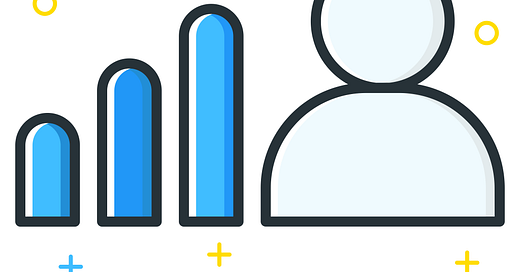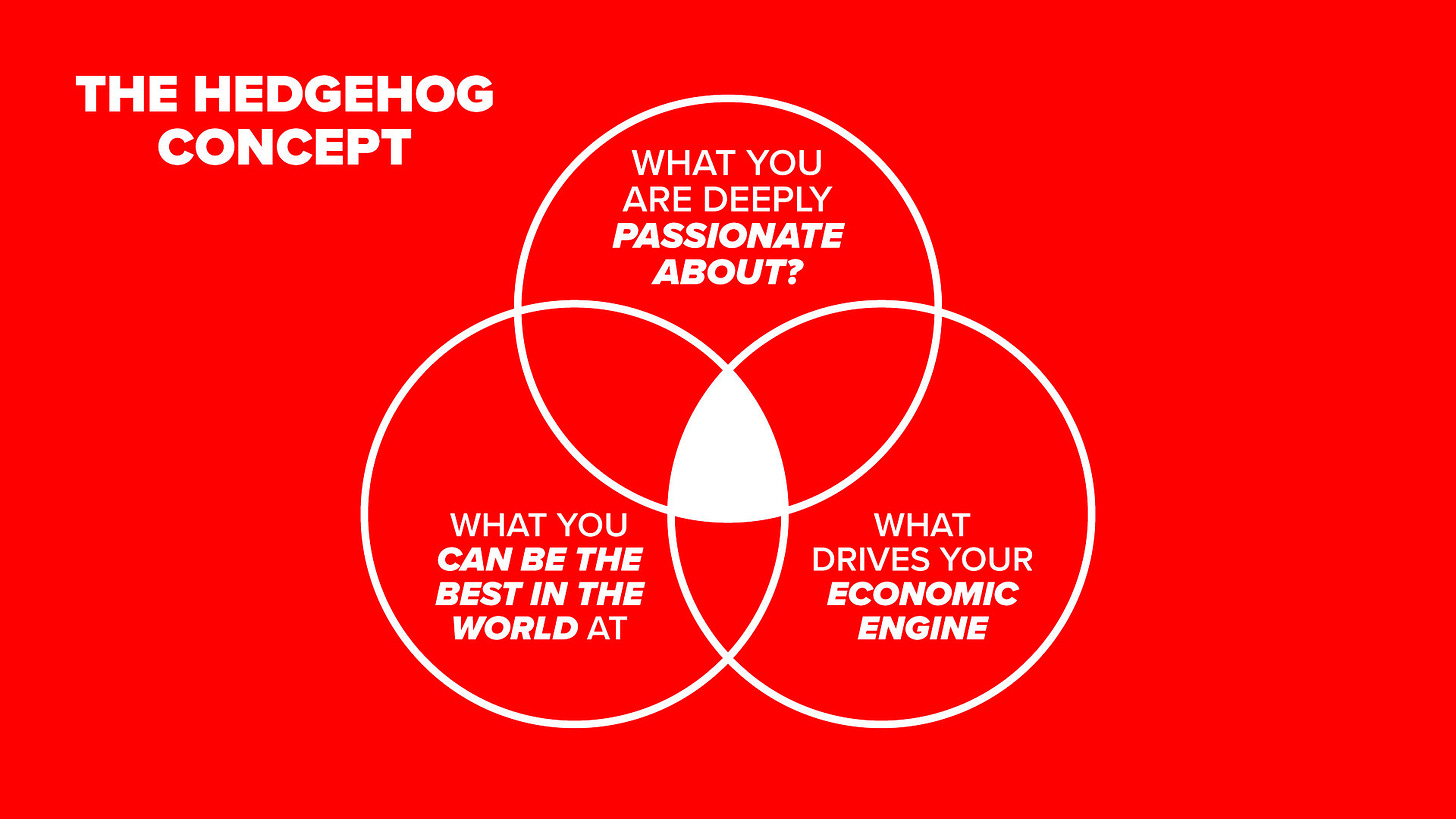I created a lifelong career framework called Betting on Yourself to combine major business career themes from some of my favorite writers and business leaders.
I’ve been thinking about these ideas over the past few years, and the goal of this framework is to combine these ideas into a clear, actionable structure to consider over the life of a business career.
I’m thinking and working through many of these ideas in real time so any feedback is greatly appreciated! (grant@makemymba.com).
Use this framework to
Gain career clarity & direction
Understand the intersection of your passion and skills
Gain specific knowledge through your passions
Drive and define your economic engine through asymmetric bets
Focus for the long term
Betting on Yourself is broken into three parts:
Define Your Focus
Take Asymmetric Bets
Play for the Long Term
Let's get started. (I’ve build a workbook with exercises that you can follow along with. Access the Notion template here).
1. Define Your Focus
The framework starts with this quote from Keith Rabois:

To become the only one who does what you do, you have to first determine what it is that you want to do. We're answering a simple, important, and difficult question: what should I work on?

You want to be working on something that intersects your passions and skills. Why? Because it will help you to build specific knowledge.
Naval Ravikant defines specific knowledge as "knowledge that you cannot be trained for. If society can train you, it can train someone else, and replace you."
Gaining specific knowledge is critical to a career framework of betting on yourself. And, it is found by pursuing your passion.

To gain specific knowledge, you have to find what feels like play for you.
These questions of how to become the only one who does what you do, what to do, and how to gain specific knowledge are difficult. But, it's all part of a larger goal of defining a focus for your career.
This is where the Hedgehog Concept from Jim Collins comes into play.
Made originally for business and later applied to careers, it's "A simple, crystalline concept that flows from deep understanding about the intersection of three circles: 1) what you are deeply passionate about, 2) what you can be the best in the world at, and 3) what best drives your economic or resource engine." (Source).
Answering the first question of the Hedgehog Concept helps you to determine your focus.
Jim Collins puts it best. When I'm passionate about my work, "I look forward to getting up and throwing myself into my daily work, and I really believe in what I'm doing.” (Source)
Answer some of these questions to find your passion:
What work am I deeply passionate about?
What type of work do I look forward to doing?
What type of work do I really believe in?
What aspect of my job do I love even when it's difficult?
Why, why, why. Why do I have passion for this?
What are some industries, causes, sectors that get me really excited?
In a career context, it's not enough to be passionate about the area. You also have to have some innate ability. This brings in the second question of the Hedgehog Concept, "What can I be the best in the world at?"
Jim Collins explain this as, "You are doing work for which you have a genetic or God-given talent, and perhaps you could become one of the best in the world in applying that talent. (I feel that I was just born to be doing this.)" (Source).
Some questions to think about when addressing this question:
What are 3 specific skills I genetically coded for? I'm naturally good at...
What feels like play to me but work to others?
The mom test: what would my mom or a family member tell me I'm exceptional at?
Conclusion of "Define Your Focus"
In this section, we took some time to define our focus. There is a lot to think about, but the general idea is to answer: "what should I be working on?"
This is a fundamental question that will take years (or decades) to answer.
Remember, you want to be working on something that is at the intersection of your passions and skills so that you can build specific knowledge.
2. Take Asymmetric Bets
As you begin to find your focus and understand what you should work on, you now must begin to take asymmetric bets: a bet where the potential upside is greater than the downside.
The idea is as follows: take many bets in your defined area of focus and gather data, experience, and opportunities from these bets. These bets can be big (starting a company in your focus area) or small (sending a cold email to someone in the industry you're breaking into).

Some others:
Start a newsletter
Send a cold DM or email a week
Write online
Take on a side project at work aligned with your interest
Take an online course
Grab coffee with the CEO of your company
These bets should be mostly in your area of focus. The bets will provide many benefits:
Continue to hone and reflect on:
What you're passionate about
What you can be the best in the world at
Acquire specific knowledge. You can only acquire specific knowledge by doing the work and gaining real experience. These bets are about taking action. It's about gaining real experience and learning more about your focus area
Establish yourself as a leader in your area
Facilitate connections in your focus area
While taking these bets, you're gaining important data to further inform your answers from the "Define Your Focus" section.
Is the focus area I've defined really the intersection of my passion and skills? Is this really what I want to be working on? And, you're gaining an understanding about the financial opportunities of your focus area.
These are called bets for a reason. Some will pay off. Most will not. However, all the bets will provide information.
These are bets on yourself (hence the title Betting on Yourself). When you take a bet in your focus area, you're taking action on what you've said in section #1 Define Your Focus. If you're passionate and skilled about this focus area where you want to work, take a bet on yourself and put it to the test. (Again, this can be big (work at a startup in your focus area) or small (write a blog post about your focus area)).
This brings us to our last question of the Hedgehog Concept: what drives my economic engine?
Answer these questions to understand what drives your economic engine:
How could I make a living in my defined focus area?
What types of careers are there in my defined focus area?
Does my boss do the type job that is in my defined focus area?
As you take asymmetric bets at the intersection of what you're passionate about and what you're good at, you can begin to gain an understanding of an important career question: can I make a living doing this?
3. Play for the Long Term
Now that we've found the area you want focus on, we have to play for the long term.
This is why #1 and #2 are so essential. You should be passionate, skilled, and have the ability to make a living in your focus area so you can play long-term games.
This requires focus. It also requires making hard choices.

And this creates options for your long-term career.

While you focus and gain real-world experience, you continue to build specific knowledge. Specific knowledge is gained through experience. It can't be taught. It's learned.
In short, you have to do the work over a long time horizon.
Playing long-term games doesn't mean you can never change what you identified as your passions and skills.
As you take asymmetric bets in your focus area, you should learn more about yourself and constantly tweak what exactly it is that you should work on.
With your unique combination of passions and skills, you will become the only one who does what you do.
Wrapping it Up
We've worked through 3 sections for the career framework:
Define Your Focus.
What should you work on? Where can you be "the only one who does what you do?" It's at the intersection of your passion and skills.
Take Asymmetric Bets.
Take action in the real world. Take risks and put your focus area to the test. Is this really what you want to work on? Can you make a living doing this? These bets will give data and help you to establish yourself in your focus area.
Play for the Long Term.
It requires focus and commitment over a long period of time to to gain specific knowledge and become the only one who does what you do.
(I’ve build a workbook with exercises that you can use to complete these sections. Access the Notion template here).





